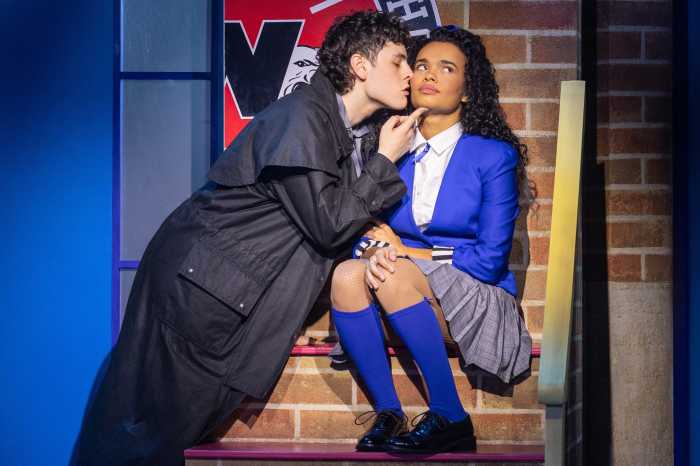Eva Longoria claims she’s seen the classic Goldie Hawn/Kurt Russell movie “Overboard” a thousand times, and with that, came much trepidation about remaking the film.
“I was such a big fan of the original,” the 43-year-old actress says. “And when I heard about the remake, I was nervous. And then I read the script and I just fell in love. It’s so different, but yet pays homage to the original.”
The difference?
In the 1987 original, rich and snobby Joanna (Hawn) falls off her yacht and gets amnesia. Dean, a carpenter (Russell) who had been working for her, tells her that she’s his wife and takes her home to live with him and his many children in their working class home.
In this new iteration, the genders swap, with a spoiled playboy named Leonardo (Eugenio Derbez) going overboard and hardworking single mother Kate (Anna Faris) takes him in, making him take a job in construction, cook dinner and clean the house she shares with her daughters. Longoria plays Theresa, Kate’s friend and employer.
“The gender flip is just so smart, especially in contemporary times,” Longoria says. “Anna [plays a] single mom, three kids, [multiple] jobs. And I think that’s something that a lot of people are going to relate to and root for because they know that woman. She’s your neighbor. She’s your friend. She’s your mom. She’s you.”
amNewYork spoke with Longoria about the film, out Friday.
What drew you to this film and playing Theresa?
I was dying to work with Anna Faris because she’s one of my comedy icons. I think she’s such a comedic genius. And I love that Theresa was a character that told the plot of the movie. She was the one that said, “This is what we’re doing. So fasten your seat belts and come along for the ride, this is what we should do.” So I felt a lot of responsibility for that and I was so excited that the movie just came together in a way that I couldn’t have even imagined.
Can you relate to Theresa?
I know Theresa. She’s a hardworking woman — great work ethic. Strong marriage, been with the same man for 20 years. Has her kids. You know, struggling to make ends meet, yet getting her kid through college. Again it’s like I know these people.
Eugenio Derbez is a big star in Mexico and is now breaking through to U.S. audiences with films like this and “How to Be a Latin Lover.” What is your take on him?
He’s making his mark. And you know his brand is really great. Eugenio’s brand is cultural diversity without hitting you over the head with a tortilla. He’s definitely saying, “This is the world we live in.” It’s authentic to who we are. It’s authentic to what you see when you walk out the door. . . . It’s refreshing. And all of his movies always have a message. They always teach us a lesson that make us think, make us feel. That’s what I really love about Eugenio’s brand as an actor, and a director and writer.
You’ve been directing a lot of TV recently. Are you looking into directing films as well?
I’m not yet. Not into features. I love the medium of television. I have always been a director/producer in my head. . . . It really taps into my whole potential as a human, using more muscles in my brain to create a project from beginning to end and having creative control of every aspect of it, not just the acting. So for me, I love it. I love directing. And I’m good at it. And it’s hard sometimes for women to admit that, even to themselves. But I’m really good at it. And that’s probably why I enjoy it so much.
Has directing changed your acting?
Yes. I don’t know if that’s a good thing. It does make you aware of how to block a scene and where the cameras go. [In the past] I worked with some great directors and I worked with some really bad ones. And now it’s obvious when you don’t work with a great director, or when the director doesn’t have an answer for you. So as an actor I think it really helps me to bring that into my directing. And when I’m directing, it really helps that I’m an actor.
Tell me about your work with the Time’s Up movement.
We launched at the Golden Globes and continue to work on the mission, which is to provide a safe work environment for men and women everywhere — not just in this industry, in all industries. That seems like a very small feat, but it has to be approached from all different angles. There’s many spokes of the wheel to tackle this big workplace environment, whether it’s policy and legislation or creating a pipeline of female leadership, or equal pay, gender equity — so many ways in which we can tackle it. And proven ways. We know that when more women are in leadership, these incidents are less likely to happen. We know that when a woman makes the equivalent of her co-worker, these things are less likely to happen. We’re pushing forward, reaching across all industries — farmworkers, domestic workers, restaurant workers — to hopefully create sustainable and long-standing change for women in the workplace.



































